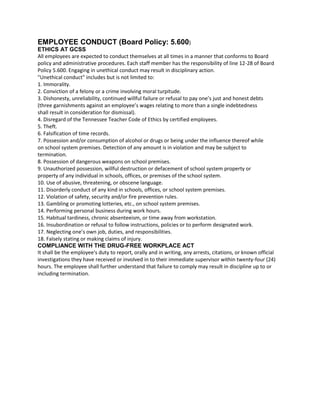Employee conduct gcss
- 1. EMPLOYEE CONDUCT (Board Policy: 5.600) ETHICS AT GCSS All employees are expected to conduct themselves at all times in a manner that conforms to Board policy and administrative procedures. Each staff member has the responsibility of line 12-28 of Board Policy 5.600. Engaging in unethical conduct may result in disciplinary action. "Unethical conduct" includes but is not limited to: 1. Immorality. 2. Conviction of a felony or a crime involving moral turpitude. 3. Dishonesty, unreliability, continued willful failure or refusal to pay one’s just and honest debts (three garnishments against an employee’s wages relating to more than a single indebtedness shall result in consideration for dismissal). 4. Disregard of the Tennessee Teacher Code of Ethics by certified employees. 5. Theft. 6. Falsification of time records. 7. Possession and/or consumption of alcohol or drugs or being under the influence thereof while on school system premises. Detection of any amount is in violation and may be subject to termination. 8. Possession of dangerous weapons on school premises. 9. Unauthorized possession, willful destruction or defacement of school system property or property of any individual in schools, offices, or premises of the school system. 10. Use of abusive, threatening, or obscene language. 11. Disorderly conduct of any kind in schools, offices, or school system premises. 12. Violation of safety, security and/or fire prevention rules. 13. Gambling or promoting lotteries, etc., on school system premises. 14. Performing personal business during work hours. 15. Habitual tardiness, chronic absenteeism, or time away from workstation. 16. Insubordination or refusal to follow instructions, policies or to perform designated work. 17. Neglecting one’s own job, duties, and responsibilities. 18. Falsely stating or making claims of injury. COMPLIANCE WITH THE DRUG-FREE WORKPLACE ACT It shall be the employee's duty to report, orally and in writing, any arrests, citations, or known official investigations they have received or involved in to their immediate supervisor within twenty-four (24) hours. The employee shall further understand that failure to comply may result in discipline up to or including termination.

